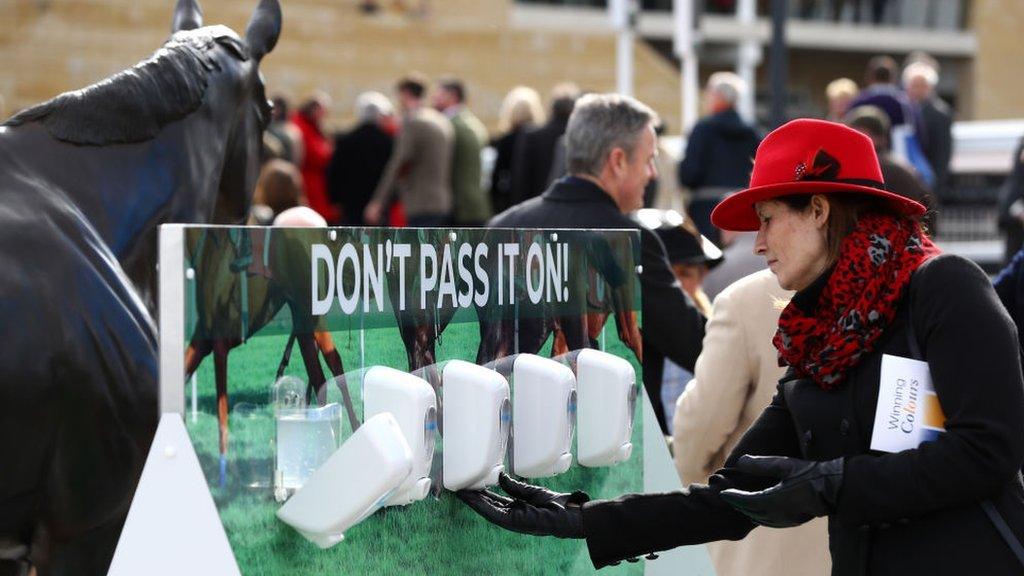Coronavirus: Cheltenham Festival 'may have accelerated' spread
- Published
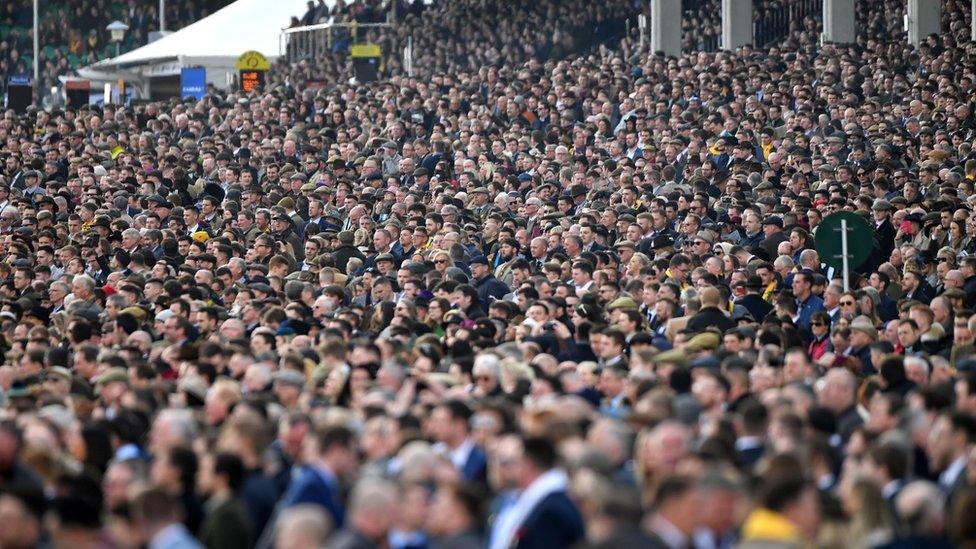
The four-day event has been described as the "best way" to spread the virus
The Cheltenham Festival could have helped to "accelerate the spread" of coronavirus, a former government chief scientific adviser said.
About 150,000 people attended the four-day event in March, which ended 10 days before lockdown measures began.
Sir David King, the government's chief scientific adviser from 2000 to 2007, said it was "the best possible way to accelerate the spread of the virus".
The government says it followed the advice available at the time.
Cheltenham Racecourse's medical director said it was not possible to know how - and where - people had contracted the virus.
Sir David was scientific adviser during the 2001 foot-and-mouth crisis in cattle, which he said helped his understanding of the coronavirus pandemic.
"When we talk about a pandemic, as I found with the foot-and-mouth disease, it's when animals from different parts of the country are crowded together that you get the virus spreading most quickly," said Sir David.
"In exactly the same way, when you have a horseracing event, [people] don't stay anything like two metres apart.
"It just seemed to me that this was the best possible way to accelerate the spread of the virus."
Prof Rowland Kao, a professor of epidemiology and data science at the University of Edinburgh, said there was "potential" for the festival to have spread coronavirus.
"These large gatherings have that potential to exacerbate transmission and, certainly looking forward, they would be among the last events that we'd expect to be resumed as we come out of lockdown," he said.
The festival ended on 13 March - 10 days before the start of lockdown. Although 250,000 tickets were sold, about 100,000 fewer people attended with many going for multiple days.
Latest figures show that 181 people have died with coronavirus in Gloucestershire's NHS hospitals.
There are now calls for an investigation into whether the decision to allow the festival to go ahead led to a rise in coronavirus cases in the county.
Gloucestershire County Council says any investigation should be led at a national level and that the number of deaths in the county could be caused by a number of reasons.
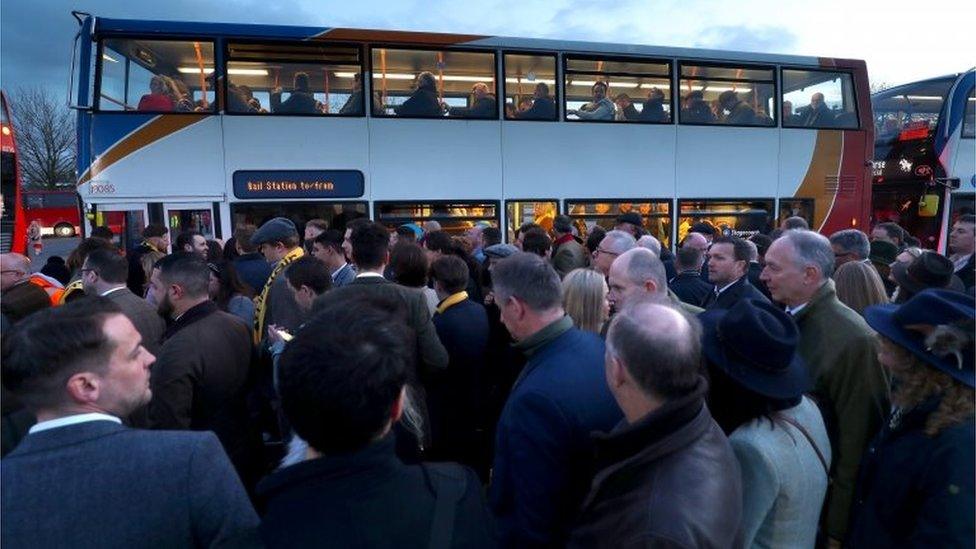
Thousands of people used public transport to get to the event
Government data shows that Gloucestershire has the highest Covid-19 death rate in the South West of England, though figures are lower than neighbouring Worcestershire and other parts of the Midlands.
Across the UK more than 26,000 people have died with the virus.
There have been reports of race-goers falling ill around the country, including West Bromwich Albion player Charlie Austin, external and Gold Cup-winning jockey Andrew Thornton.
Infectious disease consultants in two Dublin hospitals say they've treated several Irish race-goers.
The landlord of the Beehive Pub in Prestbury, Cheltenham - popular with race goers - has also died, external. There is no way to confirm where they all picked up the virus.
Data leaked to the Local Democracy Reporting Service shows Cheltenham had the highest number of coronavirus hospital admissions in the county as of 3 April.
Debbie Clifford, who lives near the racecourse, was treated for coronavirus in an intensive care unit. She did not attend the festival.
She said: "We bring in people from all over the UK and we put them into what I like to call the Prestbury Park petri dish and it's just a breeding ground for Covid to explode in this region."
Doctor Bharat Pankhania, an expert in infectious disease and public health, said events like Cheltenham Festival "without a doubt create a source for spreading infection".
"The basic science is there," he said.
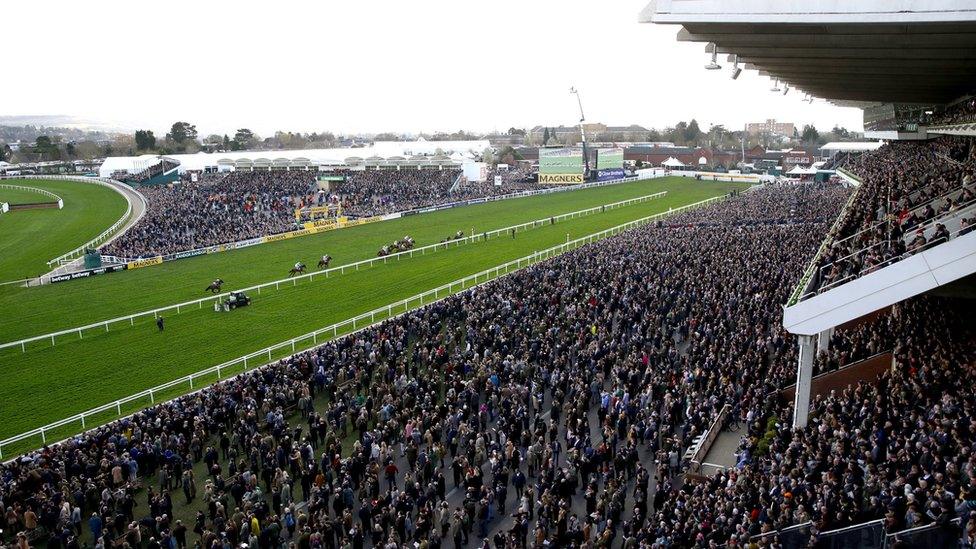
The annual event attracts people from all over the country and beyond
But Cheltenham's Conservative MP Alex Chalk said it was too early to speculate if there was a link between the festival and cases of coronavirus.
"You wouldn't judge the success of World War Two on the basis of what happened in 1939 or 1940. Now is not the time to start casting judgement," he said.
Cheltenham organisers introduced special hygiene measures including extra hand-washing stations and said they followed clear guidance from the government and science experts.
Dr Sue Smith, senior racecourse medical officer for the festival, said it was "simply not possible to know how and where someone who has tested positive for Covid-19 has contracted it".
However, Prof Kao said scientists can use a technology called deep sequencing to narrow down the possibilities.
"If you can get copies of the virus from individuals, you can look at how closely related the viruses are to each other," he said.
"If those viruses themselves were closely related the likelihood they came from Cheltenham would be higher."
Gatherings thought 'safe'
Public Health England (PHE) could not confirm if any tracing was taking place.
The impact of Liverpool's Champions League fixture with Atletico Madrid, which took place the same week as Cheltenham Festival, on the spread of coronavirus is being investigated by the city's council.
Martin Fewell, from the British Horse Racing Authority, said it was "appropriate" for mass gatherings at the point Cheltenham took place and they "took their cue" from this.
"It was inevitable when the government said that mass gatherings were safe to continue at that point, provided people followed public health advice then we would follow their lead," he added.
You can listen to a documentary looking at the impact of Cheltenham Festival on BBC Sounds.

A SIMPLE GUIDE: How do I protect myself?
AVOIDING CONTACT: The rules on self-isolation and exercise
LOOK-UP TOOL: Check cases in your area
MAPS AND CHARTS: Visual guide to the outbreak
VIDEO: The 20-second hand wash

- Attribution
- Published12 June 2020
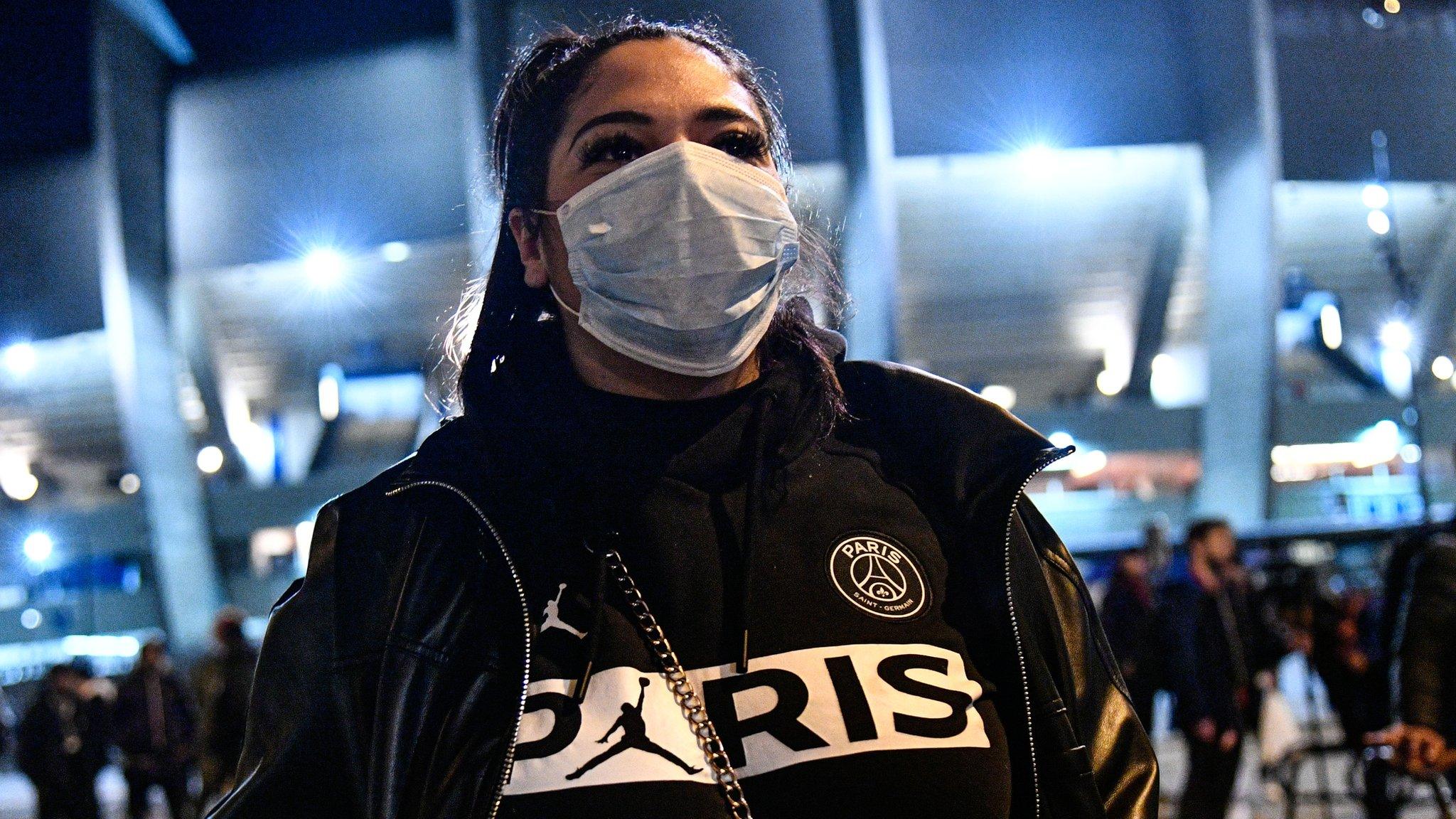
- Attribution
- Published24 April 2020
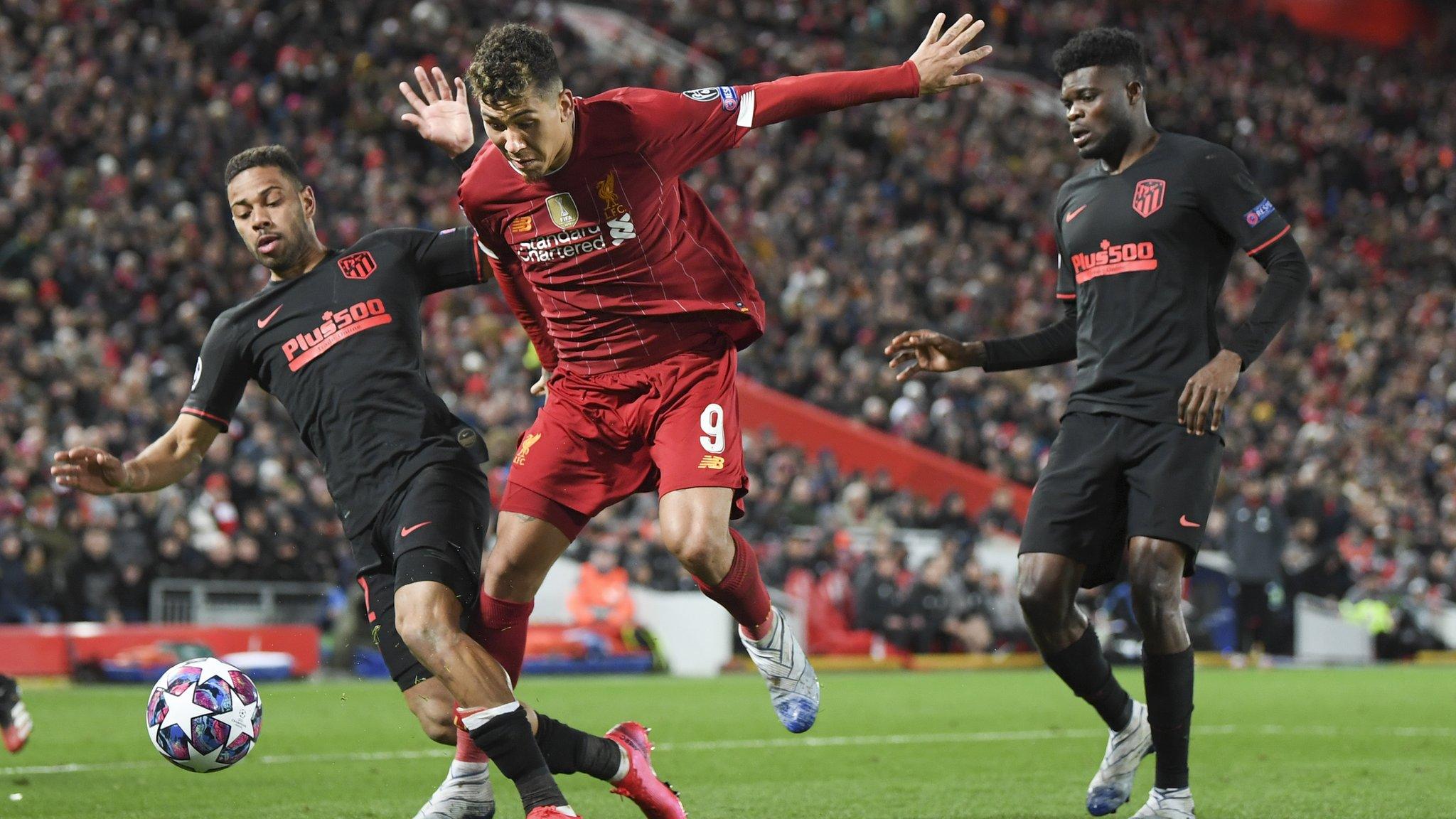
- Published23 April 2020
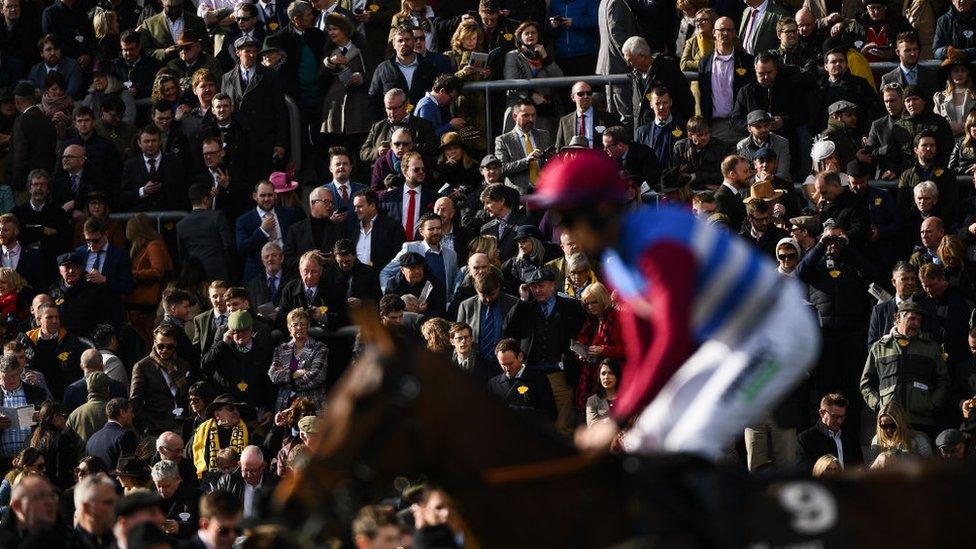
- Attribution
- Published4 April 2020
